A Comprehensive List of Cannabinoids
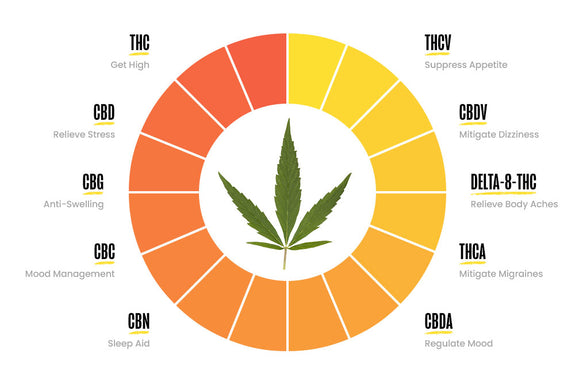
Cannabinoids have become a hot topic in recent years, as scientists and researchers uncover the vast potential of these compounds for our health and well-being.
With over 100 known cannabinoids found in the cannabis plant, these remarkable molecules are gaining attention for their potential therapeutic effects.
But what exactly are cannabinoids, and how do they interact with our bodies to produce such diverse effects?
Key Takeaways
In this guide we will explore:
- A complete list of all the major and minor cannabinoids, along with the benefits, side effects, usage and structure within each cannabinoid profile.
- The 'Entourage Effect' and how findings suggest all cannabinoids work best together, in a symbiotic way.
- A complete list of all the terpenes found in this complex plant.
- The endocannabinoid system that governs the binding affinity within our bodies.
- Synthetic cannabinoids and their health implications.
- Understanding the differences between sativa and indica.
What is a Cannabinoid?
A cannabinoid refers to a diverse group of chemical compounds primarily found in the cannabis plant, Cannabis sativa. These compounds interact with the body's endocannabinoid system, a complex network of receptors and neurotransmitters, influencing various physiological processes.
The two most well-known cannabinoids are tetrahydrocannabinol (THC) and cannabidiol (CBD), although there are over 100 other minor cannabinoids identified in the cannabis sativa plant.
Cannabinoids work by interacting with the endocannabinoid system's cannabinoid receptors, CB1 and CB2, found throughout the body.
This interaction can modulate functions such as mood, memory, appetite, pain sensation, and immune response.
Ongoing research continues to uncover the potential medical and therapeutic applications of cannabinoids, making them an area of interest in medicine and wellness.
The Full List of Cannabinoids in the Cannabis Plant
The Major Cannabinoids: THC and CBD
Delta-9-tetrahydrocannabinol (THC) and cannabidiol (CBD) are the two primary cannabinoids derived from the cannabis sativa plant. For more information on CBD vs. THC, check out this comprehensive article.

THC
- Benefits: THC offers several therapeutic benefits, including body ache management, muscle relaxation, and appetite stimulation. It has been shown to elevate mood, aid with sleep, and boost creativity.
- Side Effects: THC can cause relaxation, altered sensory perception, fatigue, and hunger. In some cases, it may lead to adverse effects such as anxiety and paranoia.
- Usage: THC can be consumed through various methods, including smoking, vaporizing, oral ingestion (edibles or oils), or topical application (creams or lotions). Medical usage of THC should always be supervised by a healthcare provider due to its potential psychoactive effects.
- Structure: THC, or Delta-9-tetrahydrocannabinol, is a complex molecule composed of 21 carbon atoms, 30 hydrogen atoms, and 2 oxygen atoms. Its unique structure allows it to easily bind with cannabinoid receptors in the brain and body, resulting in its distinct effects.

CBD
- Benefits: CBD offers a wide range of potential therapeutic benefits. It has demonstrated potential in stress management, focus enhancement and sleep improvement. It's also used widely as a post-workout recovery supplement.
- Side Effects: Unlike THC, CBD is non-psychoactive and does not cause a "high" or significant alterations in perception. Users often report feelings of relaxation and calmness.
- Usage: CBD can be consumed in various ways. It can be taken orally as oils, capsules, or gummies, applied topically as creams or lotions, or inhaled through vaping. Additionally, it is incorporated into a variety of wellness products such as bath bombs and skincare items. Its non-psychoactive nature makes it an appealing option for individuals seeking relief from discomfort without the mind-altering effects associated with marijuana or certain pharmaceutical drugs.
- Structure: CBD, or Cannabidiol, is a compound consisting of 21 carbon atoms, 30 hydrogen atoms, and 2 oxygen atoms. While structurally similar to THC, CBD differs in the arrangement of a single atom, leading to distinct effects on the body.
The Minor Cannabinoids and Their Growing Interest
While THC and CBD are the most well-known cannabinoids, there is a growing interest in minor cannabinoids for their potential therapeutic effects.
Please note that the information provided is not FDA approved and may be subject to future updates and revisions as most studies and clinical trials are executed.

CBG
- Benefits: CBG shows promise in preliminary research for various therapeutic uses. It has potential in reducing swelling, relieving body aches, and improving digestive health. Additionally, CBG may possess antibacterial properties although further studies need to performed.
- Side Effects: As a non-psychoactive cannabinoid, CBG does not induce the mind-altering effects associated with THC. Instead, it is believed to counteract the psychoactive effects of THC. CBG is generally well tolerated, with few reported side effects.
- Usage: CBG can be consumed in different forms. It can be taken orally as oils or capsules, smoked or vaped, or applied topically as a cream or lotion. As research into the benefits of CBG continues, more CBG-specific products are likely to become available in the market.
- Structure of CBG: CBG, or Cannabigerol, is often referred to as the 'mother cannabinoid' or 'stem cell' cannabinoid because other cannabinoids are derived from its acidic form, cannabigerolic acid (CBGA). CBG has a molecular structure consisting of 21 carbon atoms, 32 hydrogen atoms, and 2 oxygen atoms.

CBC
- Benefits: CBC has shown promising potential for various therapeutic benefits. Preliminary research suggests that it can assist in mood management and is a cannabinoid often used in skin care products due to it's potential improvement of skin health.
- Side Effects: CBC is non-psychoactive, meaning it does not produce a 'high' or induce any major alterations in perception. Due to its non-psychoactive nature, CBC is generally considered safe and well-tolerated. However, further research is needed to fully understand any potential side effects.
- Usage: CBC can be consumed in various ways, similar to other cannabinoids. It can be taken orally in the form of oils or capsules, inhaled through vaping, or applied topically as a cream or lotion. It is often used in combination with other cannabinoids to create a 'full-spectrum' product that harnesses the potential synergistic benefits of multiple cannabinoids working together.
- Structure: CBC, or Cannabichromene, shares the same formula as CBD and THC - 21 carbon atoms, 30 hydrogen atoms, and 2 oxygen atoms. However, it differs in the arrangement of these atoms and the bonds between them, resulting in different properties.

CBN
- Benefits: CBN has been explored for its potential medicinal benefits. Research suggests it may have sedative effects, aiding in sleep regulation. A high majority of products that focus on cannabis use for sleep contain CBN as a main ingredient.
- Side Effects: Unlike THC, CBN does not possess psychoactive properties and does not produce a 'high.' However, its potential sedative effect can induce feelings of relaxation and calmness.
- Usage: CBN can be consumed in various ways. It is commonly found in small amounts in full-spectrum CBD products, which can be taken orally as tinctures or capsules. As scientific interest in CBN continues to grow, we can anticipate the emergence of more CBN-focused products in the market, but it is currently primarily used in sleep tinctures.
- Structure: CBN, or Cannabinol, is not derived from cannabigerolic acid (CBGA) like most other cannabinoids. Instead, it is a metabolite of THC. The cannabinol derivatives are formed as THC ages and breaks down. when exposed to oxygen and heat. Structurally, it consists of 21 carbon atoms, 26 hydrogen atoms, and 2 oxygen atoms.

THCV
- Benefits: THCV shows promise in suppressing appetite, making it a potential future addition to weight loss products. Additionally, THCV exhibits properties that may help with stress management.
- Side Effects: THCV has a mild psychoactive effect, although it is less intense than that of THC. At low doses, it does not produce a "high," but higher doses may result in a clear-headed, stimulating euphoria.
- Usage: THCV can be consumed in various ways. It's most commonly inhaled through vaping, allowing for rapid absorption into the bloodstream. Alternatively, it can be taken orally, often in the form of oil or capsules. It is worth mentioning that THCV-specific products are currently less common compared to other cannabinoids, but as research progresses and demand increases, more options are expected to become available.
- Structure: THCV, also known as Tetrahydrocannabivarin, has a molecular structure consisting of 19 carbon atoms, 30 hydrogen atoms, and 2 oxygen atoms.

CBDV
- Benefits: CBDV holds several potential therapeutic benefits. It is currently being studied in treating neurological disorders such as epilepsy and multiple sclerosis, although more information is needed to make an accurate assessment on its benefits.
- Side Effects: CBDV is a non-psychoactive cannabinoid. Its effects are primarily therapeutic, however, further research is needed to fully understand the overall effects on the human body.
- Usage: CBDV can be consumed in various ways, including oral consumption through oils or capsules, inhalation through vaping, and topical application as creams or lotions. As research progresses, a wider range of CBDV-focused products are expected to become available.
- Structure: CBDV, or Cannabidivarin, has a similar structure to CBD, with a molecular formula of C19H26O2. The difference lies in the arrangement of atoms and the side chain, which gives CBDV its unique characteristics.

Delta-8-THC
- Benefits: Delta-8-THC, akin to Delta-9-THC, holds potential therapeutic benefits. It may help induce relaxation, improve mood, stimulate appetite, and act as a mild body ache reliever. It has also been reported to induce less anxiety than its counterpart Delta-9-THC.
- Side Effects: While Delta-8-THC has psychoactive properties, it's believed to be less potent than Delta-9-THC. Relatively mild side effects may include dry mouth, increased heart rate, changes in vision, and slower reaction times. It is recommended to use this cannabinoid responsibly and in moderation.
- Usage: Delta-8-THC can be consumed through various methods, such as vaping, tinctures, or edible gummies. As with all cannabinoids, it's advisable to start with a low dose and gradually increase based on personal comfort level and response. This rings especially true for psychoactive cannabinoids.
- Structure: Delta-8-THC, or Delta-8-tetrahydrocannabinol, has a similar structure to other cannabinoids, with a molecular formula of C21H30O2. Its unique characteristic lies in the placement of the double bond in the 8th carbon chain, hence the name Delta-8-THC.

THCA
- Benefits: THCA is associated with numerous potential health benefits. Research suggests that it may possess anti-swelling properties, making it potentially useful for conditions in the elderly community. Moreover, THCA might help with minor migraines.
- Side Effects: As a precursor to THC, THCA itself is non-psychoactive and does not produce a 'high'. Some people may experience unexpected results, such as dizziness or fatigue.
- Usage: THCA is commonly consumed in its raw form in dietary cannabis, such as juices or smoothies, since heat transforms it into THC. It is also available in other non-heated forms, such as tinctures, raw cannabis oils, or THCA crystalline. As research continues to unfold, the variety and availability of THCA-specific products are likely to increase.
- Structure: THCA, or Tetrahydrocannabinolic Acid, serves as the acidic precursor to THC, meaning that when the plant dries or is heated, THCA decarboxylates into THC. Its molecular formula is C22H30O4, similar to THC, but it is distinguished by the presence of an additional carboxyl group (COOH).

CBDA
- Benefits: CBDA has potential in regulating mood and reducing stress by influencing serotonin levels. Additionally, it exhibits anti-swelling properties, which may be beneficial for athletes or those with physical ailments.
- Side Effects: Research on the specific side effects of CBDA (cannabidiolic acid) is relatively limited compared to its decarboxylated form, CBD (cannabidiol). Issues such as gastrointestinal discomfort may occur.
- Usage: CBDA is commonly consumed in its raw form, often incorporated into dietary cannabis products such as juices or salads. Since heat transforms CBDA into CBD, it is typically consumed through non-heated methods. CBDA is also available in various forms, including tinctures, topical creams, and capsules. As our knowledge of CBDA continues to evolve, we can expect to see a wider range of CBDA-specific products in the market.
- Structure: CBDA, or Cannabidiolic Acid, is a non-psychoactive cannabinoid primarily found in raw cannabis plants. It serves as the precursor to CBD and undergoes decarboxylation, a process where it transforms into CBD when heated. CBDA has a chemical structure similar to CBD, but its distinct feature is the carboxyl group (COOH) present in its molecular formula (C22H30O4).
The Entourage Effect: Synergy Among Cannabinoids
The Entourage Effect is a phenomenon that occurs when the various compounds present in cannabis, including cannabinoids and terpenes, interact synergistically to generate optimal effects and benefits.
Basically, the whole is greater than the sum of its parts. When individual elements or components are combined to form a collective entity or system, the resulting whole possesses qualities, capabilities, or effects that are greater or more significant than what each part can achieve on its own.
This synergy among cannabinoids is thought to augment the overall therapeutic potency of the plant, as each compound can enhance the effects of the others, creating a more robust and holistic experience for the user.
Terpenes, the aromatic compounds responsible for the unique scents and flavors of cannabis, play a crucial role in the entourage effect. These compounds can:
- Adjust the impact of each cannabinoid compound
- Change other ligands’ binding
- Simulate cannabinoid effects
By synergizing, cannabinoids and terpenes can optimize cannabis’s therapeutic and cognitive benefits, paving the way for fully utilizing these extraordinary compounds.
The Full List of Terpenes Found in Cannabis Plants

Terpenes are organic compounds found in various plants, including cannabis, that contribute to their aroma, taste, and potential therapeutic effects.
The terpenes in this list work alongside cannabinoids to create the unique scent profiles of different cannabis strains and may also interact with the body to produce specific physiological effects.
Myrcene
Known for its earthy and musky aroma, it's found in high concentrations in some cannabis strains. It's associated with sedative effects and is believed to enhance the effects of delta 9 tetrahydrocannabinol.
Limonene
Offers a citrusy scent and is associated with elevated mood and stress relief. It's also found in citrus fruits.
Pinene
Provides a pine-like aroma and is found in pine trees. It's believed to have anti-swelling properties and may improve focus and alertness.
Linalool
Exhibits a floral scent and is also found in lavender. It's thought to have relaxing and anti-stress effects.
Beta-Caryophyllene
Often described as spicy or peppery, it's found in black pepper and cloves. It may have anti-swelling properties as well.
Humulene
Presents an earthy, woody aroma and is also found in hops. It's been suggested to have appetite-suppressant properties.
Terpinolene
Offers a complex aroma, sometimes fruity or floral, and is found in lilacs and nutmeg. It's believed to have sedative effects in higher concentrations.
Ocimene
Provides a sweet, herbal, or woody aroma and is also found in mint, parsley, and orchids. It may have anti-fungal properties.
Geraniol
Exhibits a rose-like scent and is found in geraniums. It's suggested to have potential antioxidant properties.
Phytol
Derived from chlorophyll, it has a mild grassy scent and is believed to have potential mild ache-relieving effects.
This synergy between terpenes and cannabinoids not only enhances the overall effects and benefits of cannabis but also highlights the importance of considering the full spectrum of compounds present in cannabis plants when evaluating their potential therapeutic applications.
Endocannabinoid System and Receptor Interactions
The endocannabinoid system (ECS) is a complex network of receptors and signaling molecules that plays a crucial role in regulating various bodily functions, including pain perception, mood, and immune response within the peripheral nervous system.
Scientific research shows the ECS is comprised of CB1 and CB2 receptors, as well as endogenous cannabinoids, which are naturally produced by our bodies to help maintain homeostasis and promote overall wellness.
Cannabinoids derived from the cannabis plant can interact with the ECS, either by directly binding to CB1 and CB2 receptors or by adjusting the activity of endogenous cannabinoids and other signaling molecules.
Through these interactions, cannabinoids produce a wide range of effects on our bodies, providing potential therapeutic benefits for various medical conditions and contributing to the overall health and well-being of individuals.
CB1 and CB2 Receptors: Gatekeepers of Effects
CB1 and CB2 receptors are found throughout our bodies and are responsible for mediating the effects of cannabinoids.
CB1 receptors are primarily located in the brain and central nervous system, while CB2 receptors are found in peripheral tissues, including immune cells and the gastrointestinal system.
These receptors play a crucial role in regulating the effects of cannabinoids, such as THC and CBD, as well as endogenous cannabinoids produced by our bodies.
When cannabinoids bind to CB1 and CB2 receptors, they can modulate the release of neurotransmitters, alter the conduction of pain signals, and produce anti-swelling effects, among other actions.
By interacting with these receptors and the endocannabinoid system as a whole, cannabinoids can provide a wide range of potential therapeutic benefits, including stress relief, enhanced sleep quality, and mood elevation, among others.
Endogenous Cannabinoids: The Body's Natural Regulators
Endogenous cannabinoids, such as anandamide and 2-arachidonoylglycerol (2-AG), are molecules that are naturally produced by our bodies and play a crucial role in regulating the endocannabinoid system.
These compounds can bind to both CB1 and CB2 receptors, modulating the activity of the ECS and helping to maintain homeostasis.
By regulating the activity of the endocannabinoid system, endogenous cannabinoids can influence a wide range of physiological processes, including:
- Appetite
- Mood
- Immune function
As research on the ECS and cannabinoids continues to expand, we can expect to gain a deeper understanding of how the types of cannabinoids interact with our bodies and contribute to our overall health and well-being.
Synthetic Cannabinoids and Health Implications
Synthetic cannabinoids are lab-created compounds designed to mimic the effects of natural cannabinoids, such as THC, by interacting with the cannabinoid type 1 receptor (CB1R) in the brain.
While a synthetic cannabinoid may offer some of the same therapeutic benefits as its natural counterparts, they can also pose significant health risks and legal challenges due to their potency and unpredictable effects.
Recent years have seen increased concerns about synthetic cannabinoids’ potential hazards, including drug abuse, addiction, and numerous health complications.
As our understanding of these compounds and their body impacts grows, it becomes necessary to be cognizant of the risks tied to synthetic cannabinoids and prioritize natural cannabinoids for therapeutic applications whenever feasible.
The Dangers of Synthetic Compounds and Drug Abuse
Synthetic cannabinoids can be dangerous due to their potency and unpredictable effects, which can lead to:
- Drug abuse
- Serious health complications
- Severe psychiatric and medical conditions
- Life-threatening situations
- Death
- Toxic encephalopathy
- Acute respiratory issues
- Signs of bleeding
In some cases, synthetic cannabinoids have been linked to these psychoactive effects and other adverse outcomes.
It is crucial to be aware of the potential risks associated with synthetic cannabinoids and drug abuse, as well as to prioritize the use of natural cannabinoids whenever possible for therapeutic purposes.
Regulatory Challenges and Legal Status
The legal status of synthetic cannabinoids varies across the globe, with many nations prohibiting these compounds under their respective national drug regulations.
However, regulatory challenges arise from the continuous development of new synthetic cannabinoids, making it difficult for authorities to ban specific chemicals and control their use.
As the illicit production and sale of synthetic cannabinoids continue to be a cause for concern, it is essential to address the regulatory challenges they present and to develop effective strategies for controlling their use.
This may involve:
- Improved monitoring and enforcement efforts
- Increased collaboration between governments, researchers, and healthcare professionals
- Ensuring the safe and responsible use of cannabinoid-based therapies
Sativa vs. Indica: Understanding the Differences

Cannabis is often categorized into two main types: Sativa and Indica, each with unique characteristics and effects.
Understanding the differences between these two types of cannabis can help individuals make more informed decisions about their usage, optimizing the potential therapeutic benefits of this versatile plant.
Sativa
Benefits: Sativa provides an energizing and uplifting effect, and is preferred by individuals seeking to boost their mood, focus and creativity.
Side Effects: Sativa may cause heightened paranoia or anxiety due to the higher THC content. It can lead to dry mouth or dry eyes and might lead to an increased heart rate.
Usage: Sativa is well suited for social occasions and creative pursuits due to its stimulating effect, and cannabis use with a sativa focus is more often preferred during the day time vs. indica.
Structure: Sativa plants are typically tall and thin with narrow leaves. They have a longer flowering cycle and are better suited for warmer climates with a long growing season. Sativa buds are long and thin, which aid in preventing mold in the humid environment where these plants typically grow.
Indica
Benefits: Indica provides a relaxing and sedating effect, making it ideal for those seeking to unwind and alleviate body aches or induce sleep.
Side Effects: Indica can cause drowsiness, which may not be suitable for all individuals. It may also lead to increased appetite or “munchies.”
Usage: Indica is often used in the evening due to its calming effects, making it ideal for individuals seeking to relax and decompress.
Structure: Indica plants are shorter and bushier with wider leaves. They have a shorter flowering cycle and can thrive in colder climates with shorter growing seasons. Indica buds are dense and compact, making them more susceptible to mold if not properly ventilated.
The differences between sativa and indica strains can be attributed to their distinct cannabinoid profiles, with sativa strains typically containing higher concentrations of THC and lower concentrations of CBD, while indica strains tend to have higher concentrations of CBD and lower concentrations of THC.
Summary
In conclusion, this article has delved into the complex aspects of cannabinoids, both major and minor and both natural and synthetic.
We've discussed the benefits, side effects, usage and structure of each cannabinoid and the part they play together in cannabis use with the "Entourage Effect".
We've discussed the role that the endocannabinoid system plays in regulating physiological processes such as appetite, mood, and immune function and the ongoing research that aims to deepen our understanding of this interaction.
We have also shed light on the risks associated with synthetic cannabinoids, from their potential for drug abuse and serious health complications to the challenges they present in a regulatory context.
Furthermore, we have explored the differences between the Sativa and Indica cannabis strains, highlighting their unique effects, benefits, side effects, usage, and structural characteristics.
This comprehensive understanding of cannabinoids, coupled with increased collaboration between governments, researchers, and healthcare professionals, can guide us towards safer and more responsible use of cannabinoid-based therapies.
Frequently Asked Questions
What are the big 6 cannabinoids?
The "Big Six" cannabinoids include CBD, THC, CBN, CBG, CBC, and THCV.
What does total cannabinoids mean?
Total Cannabinoids refers to the sum of all cannabinoids present in a cannabis strain, including both major and minor compounds. This value is often used as an indicator of the potency or strength of a particular strain.
What other plants have cannabinoids?
Cannabinoids can also be found in various other plants such as echinacea, black pepper, and cacao, however, they are typically present in much smaller concentrations compared to cannabis.
How many types of cannabinoids are there?
There are over 100 identified cannabinoids present in cannabis, out of over 600 chemical compounds found in the plant.
What terpenes are good for anxiety?
Several terpenes found in cannabis have been associated with stress relief due to their potential calming and relaxing effects. Here are a few examples:
Linalool: Thought to have calming and anti-stress effects, which may be beneficial for individuals suffering from anxiety.
Myrcene: This terpene is associated with sedative effects and is believed to enhance the calming effects of certain cannabinoids.
Limonene: Associated with mood elevation and stress relief, potentially offering beneficial effects for those dealing with stress.
Please note that while these terpenes have been associated with potential stress relief, more research is needed to fully understand their effects and therapeutic applications for stress and other conditions.
What terpenes are good for pain?
Some terpenes found in cannabis have been associated with potential ache-relieving effects. Here are a few examples:
Beta-Caryophyllene: This terpene has been suggested to have anti-swelling and potential muscle recovery properties.
Linalool: Thought to have relaxing and anti-stress effects, potentially beneficial for individuals dealing with body aches and related discomfort.
Again, more research is needed to fully understand the potential of these terpenes for pain management. Always consult a healthcare professional before using cannabis or any other substance for relief of body aches.
Ready to fight the Sunday Scaries? Shop our CBD Gummies for Focus, CBD Candy, CBD Treats for Dogs, CBD Gummies, CBD Oil Tinctures, CBD Sleep Oil, Extra Strength CBD Gummies, Delta-9 THC Gummies, CBD Edibles, and Vegan CBD Gummies online today!

 CBD Gummies
Stress Relief
CBD Gummies
Stress Relief
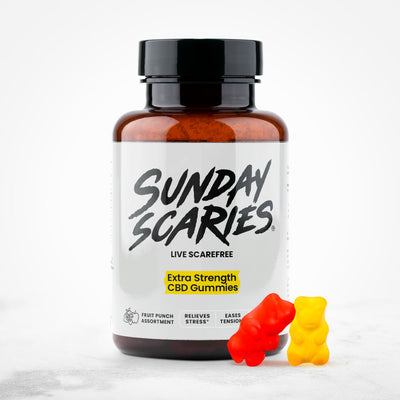 Extra Strength CBD Gummies
Stress Relief
Extra Strength CBD Gummies
Stress Relief
 Vegan CBD Gummies
Stress Relief
Vegan CBD Gummies
Stress Relief
 CBD Gummies for Focus
Focus Boost
CBD Gummies for Focus
Focus Boost
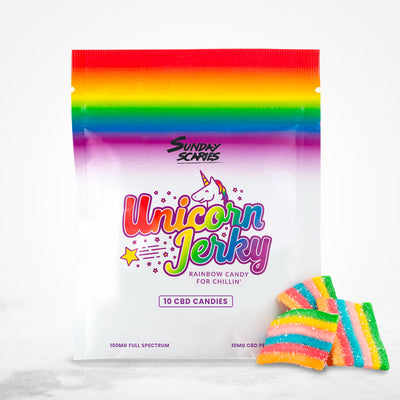 CBD Candy
Mood Lift
CBD Candy
Mood Lift
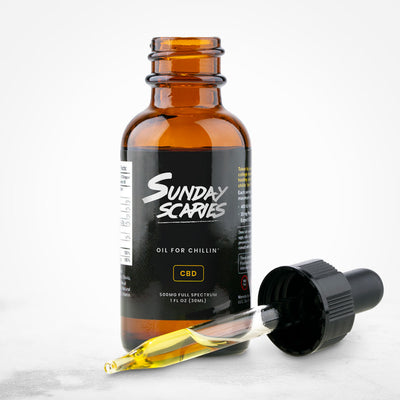 CBD Oil Tinctures
Stress Relief
CBD Oil Tinctures
Stress Relief
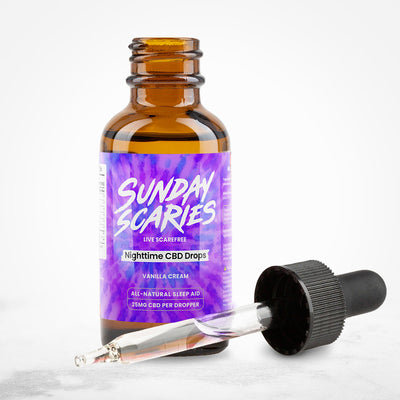 CBD Sleep Oil
Sleep Aid
CBD Sleep Oil
Sleep Aid
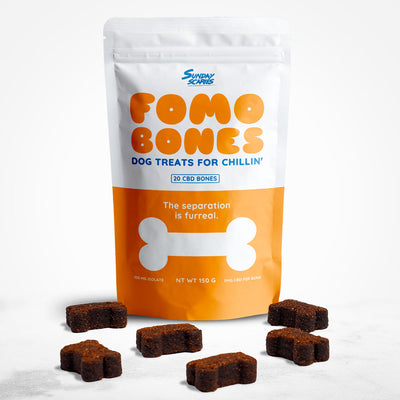 CBD Dog Treats
Stress Relief
CBD Dog Treats
Stress Relief
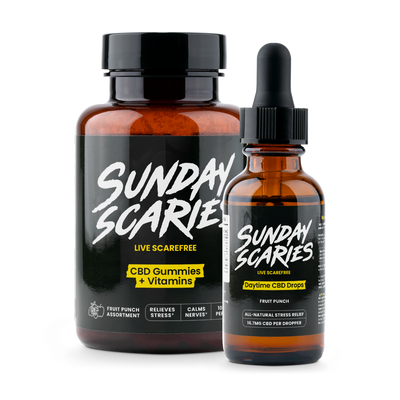 Side Piece Bundle
Stress Relief
Side Piece Bundle
Stress Relief
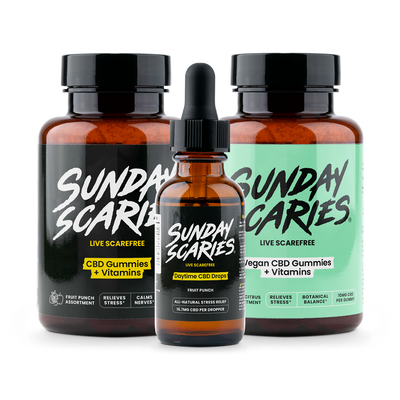 Rando Bundle
Rando Bundle
 Delta-9 THC Gummies
Euphoria
Delta-9 THC Gummies
Euphoria
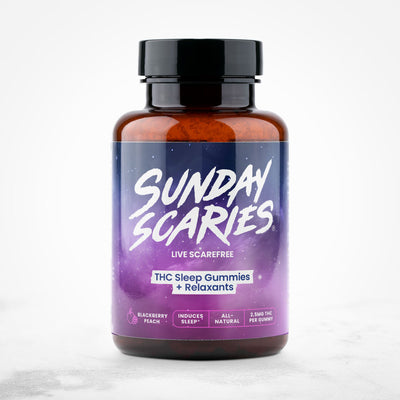 THC Gummies for Sleep
Sleep Aid
THC Gummies for Sleep
Sleep Aid
 Sunday Scaries® Snapback
Sunday Scaries® Snapback
 Sunday Scaries Shirt
Sunday Scaries Shirt
 Sunday Scaries Sweatshirt
Sunday Scaries Sweatshirt
 Dabbing Bear Blanket Jacket
Dabbing Bear Blanket Jacket



